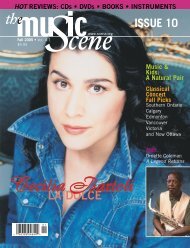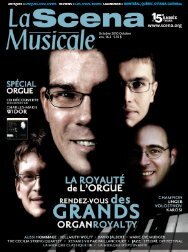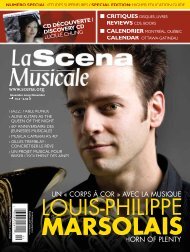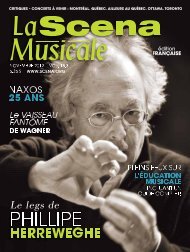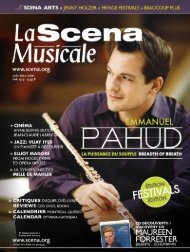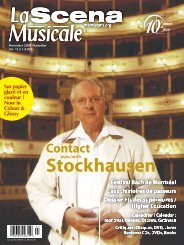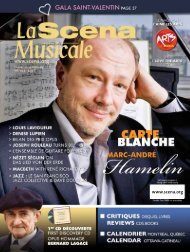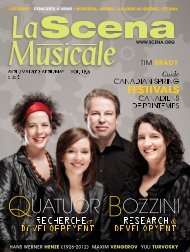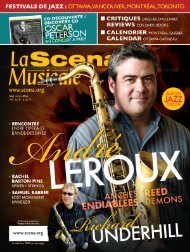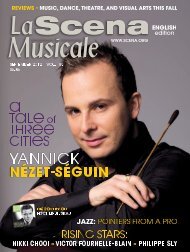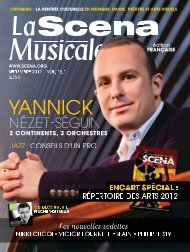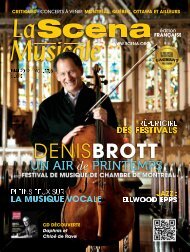You also want an ePaper? Increase the reach of your titles
YUMPU automatically turns print PDFs into web optimized ePapers that Google loves.
discovery cd<br />
Transposing Tradition<br />
by HÉLÈNE BOUCHER<br />
november 2 nd saw the release of the second album<br />
by Trois-Rivières duo Antoine Bareil, violin, and<br />
Sébastien Lépine, cello. In Works for violin and<br />
cello based on old folk melodies, available in<br />
January 2012 on the XXI-21 label, the virtuosic duo<br />
take up the melodies that inspired the likes of Bartók, Dvořák, Smetana,<br />
and Stravinsky to introduce popular culture into classical music.<br />
Bareil and Lépine, crazy virtuosi<br />
The most recognizable thing about the Bareil-Lépine duo is<br />
the obvious pleasure they take in playing on stage. Their famous<br />
‘Soaring Strings’ concert impressed audiences in Quebec<br />
and Italy in 2008. Perfectly in sync, yet still fresh and<br />
impulsive, they thrilled 120 different audiences, both amateur<br />
and seasoned. Their first album, Works for violin &<br />
cello, was critically acclaimed, winning them the Prix Opus<br />
for disc of the year.<br />
The two performers established their duo in 2006, brought together<br />
by a common outlook on music and performance, and by a desire<br />
to stray from the beaten path. “It’s important for us to find and<br />
adapt a repertoire that will take the public where it wouldn’t otherwise<br />
go,” Antoine Bareil says. This public keeps coming back for more of<br />
Bareil and Lépine’s brand of fun, as well as the accompanying musical<br />
education. The non-conformist spirit of these “crazy strings” is<br />
also seen in their direct contact with the audience.<br />
A tribute to the 20 th century<br />
The rapport between the violin-cello duo is also tied to their mutual<br />
affection for 20 th century repertoire. This is an affection born of necessity,<br />
relates Bareil: “We had to find compositions which featured<br />
violin and cello equally. That took us away from Beethoven and<br />
Mozart. The 20 th century furnished the sound we were looking for.”<br />
Ravel’s Sonata for Violin and Cello, written in 1920 and dedicated to<br />
Debussy, was the duo’s first project.<br />
Back to the people’s folk music<br />
The idea for the second album took shape during Bareil and Lépine’s<br />
latest Canadian tour. “Our concert, Soaring Strings, made us realize that<br />
the public has a real feeling for folk melodies. Those songs clearly draw<br />
on a deep, collective sense of belonging,” Bareil explains. This path of<br />
exploration led the way toward new compositions. Their research was<br />
successful, opening up varied musical horizons. At the head of the album<br />
is Béla Bartók’s Hungarian Folk Melodies for Violin and Cello. Bartók’s<br />
undertaking from 1905 to 1908 greatly inspired the duo in their own research.<br />
“Bartók travelled throughout Hungary to collect his country’s<br />
songs and melodies from the peasants. Oral tradition played a major<br />
role in his compositions,” the duo explains. The album circles around<br />
the works of Belgian Joseph Jongen (1873-1953), Norwegian Johan<br />
Halvorsen (1864-1935), German Helmut Lipsky, and American Mark<br />
O’Connor.<br />
A musical journey through the folk music of other<br />
times and places, Works for violin and cello based on old<br />
folk melodies is a harmonious whole, as Antoine Bareil<br />
attests: “Touches of the American and Irish musical heritage<br />
can be heard, as well as influences from the waves<br />
of immigrants of the 20 th century.” Transposing traditional<br />
music from another century does not seem to pose<br />
much of a challenge for the duo. Through their style of<br />
playing and their approach to repertoire, the pair sees an easy way to<br />
connect with music lovers of all ages. Music will always be “that wonderful<br />
escape, that last refuge to stop everything, think things over,<br />
and dream,” stated the violinist-composer. The album includes one of<br />
his pieces, composed in 2009, Variations sur “Mon merle.”<br />
Soaring Strings, which won the Louis-Philippe-Poisson Performing<br />
Arts award, will continue into 2012. The crazy virtuosi will then prepare<br />
themselves to tour their new album across Canada and eventually<br />
Europe, bringing along their joyous and impulsive stage presence.<br />
The pair have a few visual surprises up their sleeve, but nothing that<br />
will compromise their treasured contact with their audience. The musicians<br />
are looking forward to showing their skill on some extraordinary<br />
instruments: an 1800 Vuillaume violin and a Stradivarius cello<br />
from 1699. Is there a second Prix Opus (oh, how they wish!) in the<br />
duo’s future? As long as music brings them joy, the duo will happily<br />
continue.<br />
For the December/January Discovery CD, <strong>La</strong> <strong>Scena</strong> <strong>Musicale</strong> and XXI-21 Productions<br />
present Antoine Bareil and Sébastien Lépine playing works for violin and<br />
cello duo. The Discovery CD is available free to our <strong>subscribe</strong>rs, or you can<br />
contact us directly for individual purchase.<br />
TRANSLATION: KARINE POZNANSKI<br />
LSM<br />
PHOTO Duchesne Côté<br />
10<br />
DECEMBER 2011 / JANUARY 2012



